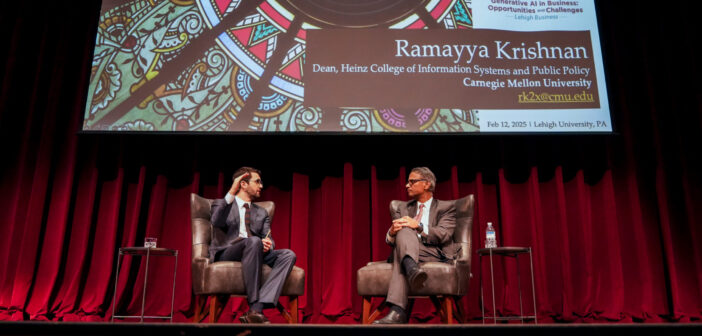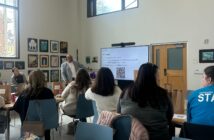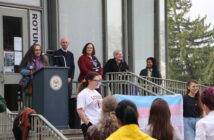Artificial intelligence has made major developments in recent years, and with these advancements, concerns have emerged about its impact on businesses and society at large.
Ramayya Krishnan, dean of the Heinz College of Information Systems and Public Policy at Carnegie Mellon University, discussed AI and the concerns surrounding it on Wednesday at Lehigh’s Zoellner Arts Center. The talk was titled “AI, Strategy and the Future of Work: Navigating Opportunities and Risks.”
The talk was held as part of the College of Business’ Year of Learning Series, which is a college-wide initiative focusing on specific areas of interests. This year’s theme is generative AI.
Krishnan’s experience with AI is extensive, spanning various governmental areas.
He chaired the AI Futures Committee of the National AI Advisory Committee, which advises the president on security challenges and ensures the Intelligence Community acts with integrity.
He was appointed to the National AI Advisory Committee to the President of the United States and the National AI Initiatives office in 2022, and he was appointed chair of the Department of Defense’s Responsibility AI Academic Council in 2023.
Throughout his talk, the key sentiment Krishnan continued to emphasize was that when AI and a human complement each other, the quality of work can be even higher than either on their own.
To begin his talk, he said AI has caused disruptions in businesses and other fields, such as scientific areas, which has led to widespread concern.
Though some believe AI began with the release of ChatGPT in 2022, Krishnan provided a more accurate look at its history to better understand recent advancements. He said AI first emerged among a small group of scientists in 1956 at the Dartmouth Summer Research Project on Artificial Intelligence.
“It’s important to take stock of the full period of time that AI has existed,” Krishnan said.
He said today there are five key trends he has identified surrounding AI — deepfakes and generative content, multimodal models, integrating large language models with traditional software, large language models and reasoning, and the rise of specialized open-source models.
Going into each trend, Krishnan touched on AI’s impact across different fields, including its ability to enhance accuracy and efficiency, and the importance of recognizing the skills that AI can’t replace.
Using an example focused on scientists and their ability to generate numerous hypotheses, Krishnan said AI can assist in testing theories, but human expertise is essential for determining which hypotheses should be prioritized.
Greg Reihman, Lehigh’s vice provost for Library and Technology Services, said in some areas, individuals with advanced technology skills gain more from using AI tools than those who are just starting to develop those skills.
“I think that presents a challenge to universities, because we’re trying to engage in the long process of helping people develop those skills,” Reihman said.
When asked how schools and universities can integrate these developmental skills into the education system, Krishnan said everyone should know the basics of AI to understand what it is, as well as what it can and can’t do.
“We will need critical thinkers and active learners that are sensing, responding and continuously learning,” he said.
Another major point Krishnan circled back to throughout his talk was the power of critical thinking skills and good problem solving, which are things unique to human workers.
He emphasized that the need for these skills is a very timely topic.
“The more we’re thinking about the broad range of issues that are related to an emerging technology, like generative AI, the better we’re going to be able to address it for our students, faculty and staff in the future of the university,” Reihman said.
While highlighting many positives of AI, Krishnan also addressed the potential consequences, such as the risk of deep fakes and the lack of protection for intellectual property.
An audience member also asked about another consequence — AI’s impact on the climate.
Krishnan responded by saying while there are climate implications, not all AI tasks require the most energy intensive models. Instead, he suggested improvements need to be made in data centers energy efficiency.
AI’s rapid growth in recent years may seem daunting and some jobs may be taken over by AI, but Krishnan said this has happened with other technologies in the past.
He said there will always be a necessity for humans’ specific skills, such as critical thinking, the ability to learn and analyze information, and problem solving.
Erin Casciano, digital marketing and events coordinator of the College of Business, said she was very interested to hear Krishnan’s perspective on AI and left with some new insights.
“I took away that I shouldn’t fear AI and should see how it can make our lives better and more efficient,” Casciano said.






Comment policy
Comments posted to The Brown and White website are reviewed by a moderator before being approved. Incendiary speech or harassing language, including comments targeted at individuals, may be deemed unacceptable and not published. Spam and other soliciting will also be declined.
The Brown and White also reserves the right to not publish entirely anonymous comments.